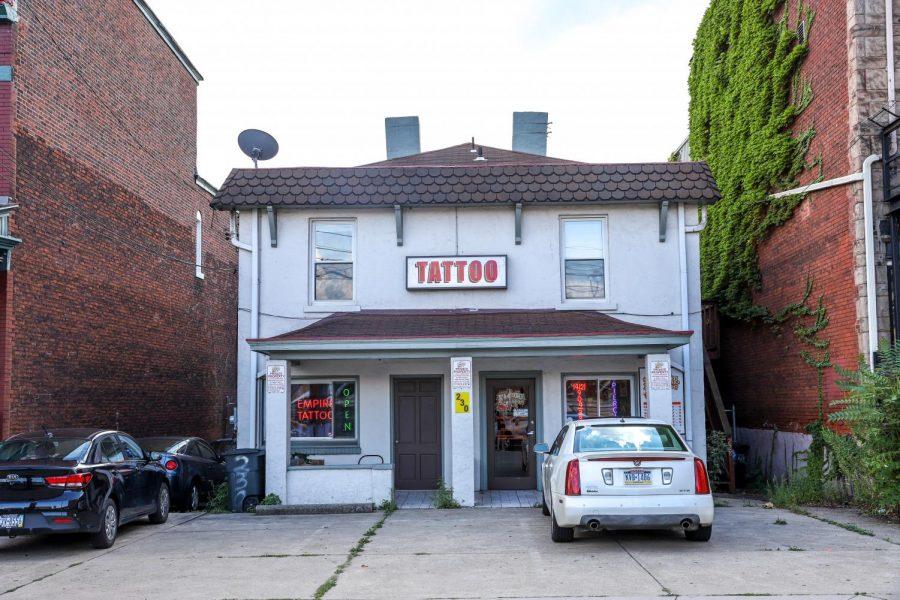‘More motivated than ever’: Pittsburgh tattoo shops persevere through pandemic
Kaycee Orwig | Assistant Visual Editor
Pittsburgh tattoo artists are navigating the world of socially distanced tattooing and attempting to ensure safety for their clients while coping with the pandemic themselves.
August 17, 2020
Despite the COVID-19 pandemic still raging in the United States, many tattoo shops in Allegheny County are open for business. The shops that survived months of closure reopened to a world where staying 6 feet apart is a necessity for life, while closing that distance to a client is a necessity for their livelihood.
Pittsburgh tattoo artists are navigating the world of socially distanced tattooing and attempting to ensure safety for their clients while coping with the pandemic themselves. Despite a faltering economy, many artists said they’ve seen a surprising spike in business, a welcome problem that has nevertheless created difficulties in safely keeping up with demand.
Paul DeMarco, manager and artist at Empire Tattoo on Meyran Avenue, remembers seeing COVID-19 in the news only a few days before having to close.
“It was really sudden,” DeMarco said. “We didn’t know what to do. We just shut the door, put up a sign, made a few Facebook posts and stayed home for two and a half months.”
Other individual artists forged their own paths, even through the sudden change. Susie Humphrey tattooed at Pittsburgh Tattoo Company Downtown for five years before leaving in late February. Humphrey followed through on plans to create Sanctuary, her own private tattoo studio in Lawrenceville, just before the statewide shutdown in mid-March.
“I signed my lease for Sanctuary on March 1, which was terrible timing,” Humphrey said. “I’m not only tattooing through a quarantine, I decided to open a business in the middle of a quarantine.”
Humphrey brought her clientele with her to her new studio and leaned on their support when she went through her entire savings in January and February.
“I had clientele pre-book appointments and pay deposits,” Humphrey said. “I designed T-shirts and did a presale and sold enough T-shirts to cover my rent for May.”
Humphrey was not the only tattoo artist who made entrepreneurial advances during the shutdown. Drew Armstrong, a 2019 Pitt alumnus, said he had to reschedule a long-awaited appointment with his artist for a similar reason.
“My artist made a new post that said that the shop she was working at decided to close, so she’s opening up her own private studio,” Armstrong said.
Other artists survived the two-and-a-half-month shop closures through various other means. Michael Cipollone, who has tattooed as an independent contractor for In The Blood Tattoo studio in South Side for eight years, said he was able to get by on his savings.
“I used my off time to paint and create a lot of new tattoo designs and artwork. I also focused on more cooking, reading and bike riding,” Cipollone said. “It was nice to be able to do a hard reset and come back to work energized and more motivated than ever to tattoo.”
Aaron Harding, who tattoos for Pittsburgh Tattoo Company, said he also used the time off to work on artistic pursuits.
“I wasn’t able to tattoo for over two months, so I tried to keep myself busy by painting signs and skateboards for friends,” Harding said. “It was a much-needed break to be honest.”
When Allegheny County moved to the green phase of reopening on June 5, tattoo shops opened to what several artists saw as a surprising spike in business. Humphrey has a monthslong waitlist, and Harding said that business has been “crazy.”
“It has been absolutely insanely busy since the reopening,” Harding said.
The exact reason for the spike in business isn’t clear, and several artists speculated as to why there has been an influx of clients. Cipollone pointed out that many people have more free time, and may have also received money from the government that they want to put toward getting a tattoo. DeMarco speculated that there was pent-up demand.
“We have had a wild response to reopening,” DeMarco said. “A lot of people want to support small businesses. A lot of our regular clients are like, ‘Hey, we’re gonna come in and get something.’ It’s been a little overwhelming.”
The influx of business while the pandemic is ongoing poses challenges to the safety of artists and their customers. But Armstrong said he didn’t feel that he was taking too much of a risk by getting a tattoo.
“They had these guidelines that only one person would be able to get tattooed at a time and you wouldn’t be able to bring any friends,” Armstrong said.
Harding said he was worried about the safety of returning to work, but that worry has waned since coming back.
“We’ve always maintained a sterile work environment, so not much has changed outside of wearing a mask,” Harding said.
Beyond the safety precautions that shops are taking, artists have recommendations for best practices for safely scheduling an appointment. DeMarco recommended wearing a mask and staying home if you’d traveled recently, as did Humphrey, along with a few other recommendations.
“I would definitely say that making an appointment ahead of time is the safest, best way to get any tattoo at any studio, just because you’re not walking in on, potentially, multiple people in the lobby and [artists are] prepared for you,” Humphrey said.
But even though there has been an influx of business since reopening, many artists expressed concern for their future.
“If there’s anything that 2020 has shown us, it’s that you can never really plan for anything,” Humphrey said. “You have to adapt and change as your environment changes.”








